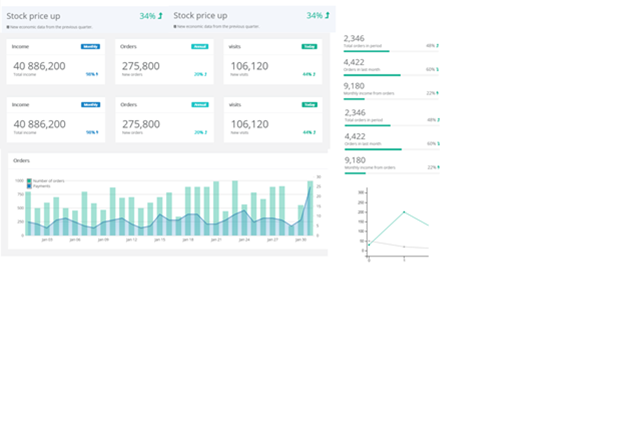What’s the next big thing in mobile development? Many analysts and industry watchers say it’s artificial intelligence (AI). They expect it to be used for many purposes, including embedding chatbots into retail apps, adding built-in smarts to traditional enterprise applications like ERP, and integrating with context-aware smart sensors. Here’s what to expect when it comes to AI and mobile apps in the coming year.
Gartner vice president and Gartner Fellow David Cearley says that intelligent apps will be one of the top ten strategic trends. He’s talking about more than just virtual digital assistants that make common tasks like prioritizing email easier. Instead, he sees them built into every category of mobile app in the enterprise, particularly marketing and ERP. In fact, Gartner is so bullish on AI everywhere that it expects most of the 200 largest companies in the world to have developed intelligent apps by 2018.
If you’re building a retail app in the coming year, AI may be vital because your competitors could well already be using it. In early December, Starbucks announced a new AI-powered mobile app called “My Starbucks Barista.” Just tell the app what you want, and it places the order for you. If you’ve instead got a craving for Tacos, you can order from Taco Bell using the TacoBot, which doesn’t just take orders, but also recommends menu items and answers questions.
Merging AI, context awareness and mobility
What sets mobile apps apart from traditional applications on desktop PCs is their ability to be aware of their location and the outside world using sensors. Adding AI to the mix will make apps even more useful. AI and machine learning will use input from the sensors and based on that, make recommendations on what you should do next.
Zulfi Alam, General Manager at Microsoft, points to the example of a fitness tracker that uses sensors to measure the amount you exercise, your fitness level, and heart rate. He writes in a blog, “Imagine you’ve set the goal that you want to get fit and lose weight as part of your exercise routine. Based on your burn rate and exercise over one week,” an app can auto-suggest a customized workout plan for you.
Analysts expect this kind of AI capability to be built into many mobile apps in the coming year, not just for fitness trackers. As a result, developers who can build contextually aware, intelligent apps that make use of big data will be in demand.
Finally, AI will potentially be used in the development process as well, although it’s not close to replacing developers yet. Forrester’s Diego Lo Giudice says AI will eventually transform the way applications are built. In the short term, though, he expects it to be used primarily to automate app testing. He concludes, “Firms are looking to AI both to increase test automation to unprecedented levels and test in much smarter ways, and lower the costs for it.”
So don’t worry. A robot won’t take your job anytime soon.
Read why this trend will be further fueled by cheaper sensors.
Read how the oil and gas industry will benefit from these mobile innovations.
Gartner vice president and Gartner Fellow David Cearley says that intelligent apps will be one of the top ten strategic trends. He’s talking about more than just virtual digital assistants that make common tasks like prioritizing email easier. Instead, he sees them built into every category of mobile app in the enterprise, particularly marketing and ERP. In fact, Gartner is so bullish on AI everywhere that it expects most of the 200 largest companies in the world to have developed intelligent apps by 2018.
If you’re building a retail app in the coming year, AI may be vital because your competitors could well already be using it. In early December, Starbucks announced a new AI-powered mobile app called “My Starbucks Barista.” Just tell the app what you want, and it places the order for you. If you’ve instead got a craving for Tacos, you can order from Taco Bell using the TacoBot, which doesn’t just take orders, but also recommends menu items and answers questions.
Merging AI, context awareness and mobility
What sets mobile apps apart from traditional applications on desktop PCs is their ability to be aware of their location and the outside world using sensors. Adding AI to the mix will make apps even more useful. AI and machine learning will use input from the sensors and based on that, make recommendations on what you should do next.
Zulfi Alam, General Manager at Microsoft, points to the example of a fitness tracker that uses sensors to measure the amount you exercise, your fitness level, and heart rate. He writes in a blog, “Imagine you’ve set the goal that you want to get fit and lose weight as part of your exercise routine. Based on your burn rate and exercise over one week,” an app can auto-suggest a customized workout plan for you.
Analysts expect this kind of AI capability to be built into many mobile apps in the coming year, not just for fitness trackers. As a result, developers who can build contextually aware, intelligent apps that make use of big data will be in demand.
Finally, AI will potentially be used in the development process as well, although it’s not close to replacing developers yet. Forrester’s Diego Lo Giudice says AI will eventually transform the way applications are built. In the short term, though, he expects it to be used primarily to automate app testing. He concludes, “Firms are looking to AI both to increase test automation to unprecedented levels and test in much smarter ways, and lower the costs for it.”
So don’t worry. A robot won’t take your job anytime soon.
Read why this trend will be further fueled by cheaper sensors.
Read how the oil and gas industry will benefit from these mobile innovations.







Comment